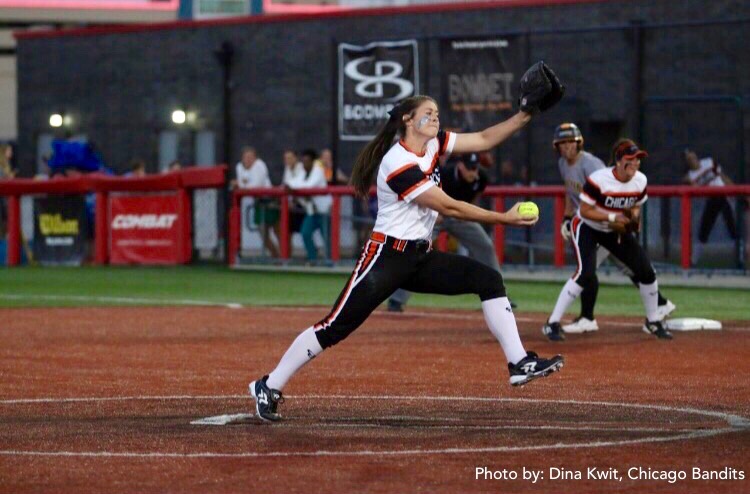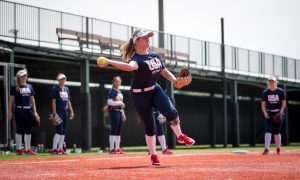What Age Should Softball Pitchers Start Pitching?

The pitcher position is one of the most sought after on the softball playing field. Like all other eight positions, the pitcher serves an important role on the field and among the team. Teams with strong pitching have a greater chance to win on game days. A common question asked by parents and coaches is, “at what age should softball pitchers start pitching?” Some people believe that the earlier the pitcher starts pitching the better. Others will argue that starting too young will have a negative impact and waiting until the pitcher is a little older is the way to go.
The majority of softball pitchers will begin their pitching careers at the 10U age level. Most of the time, it’s not a voluntary choice by the pitcher. Think back to your 10U playing or coaching days. It was not uncommon for coaches to line up every player on the team and have them pitch balls into a wall or a fence to evaluate who the team pitchers would be. This is how I was selected to represent my team in the circle during my second year of 10U softball almost 18 years ago. Would I have got into pitching on my own? I am not sure, but I am forever grateful I was chosen for the opportunity.
Often times, 10U players need a little guidance or push in the right direction. Parents and coaches shouldn’t feel guilty about suggesting their player try a specific position. 10U softball players are like sponges. They are eager and ready to absorb as much softball knowledge as they can fit into their minds. Giving pitching instruction to beginner 10U players is extremely rewarding for a few reasons. First, it’s like starting with a blank canvas. Instructors have the ability to provide information that the pitcher can apply and she will begin to paint her canvas. Second, it’s important that pitchers learn to pitch the correct way. When pitchers are younger there is a greater chance that they haven’t formed any bad habits that will need to be corrected. If they learn the correct way, they will be able to practice the right way, and this will set them up for a successful career if they continue to put the work in.
Even though there are many positives to becoming a pitcher at a young age, there are likely to be hurdles and associated risks along the way. Pitching takes time and practice. Pitchers will need to put in their own pitching practices on top of team practices if they wish to maintain and further develop their craft. The risk of burning out is becoming very common at the younger age levels. It’s important that coaches and parents have an open dialogue with their young pitcher and don’t over-do it. If a player expresses signs of burning out at a young age, it is likely that this player will eventually burn herself out of the sport completely.
Another hurdle or risk associated with pitching at a young age is the development of bad habits. Even if a pitcher learns from an expert from scratch, they won’t have eyes on them all of the time. Young pitchers don’t have as much muscle memory or body control developed and the chance of a habit forming are likely. It’s important that young pitchers seek proper instruction to learn and to maintain their pitching mechanics throughout their entire career.
12U pitchers may think they are late to the game if they choose to begin pitching at this level. This assumption is false. There is no reason that a 12U pitcher who is new to pitching, wouldn’t be able to pick it up. In fact, they may be able to do so faster and more efficiently than a beginning 10U pitcher. 12U players are older, bigger, stronger, and they may be able to understand a pitching function easier without the instructor having to go into much detail. 12U pitchers have more body awareness and control, which makes it easier to learn and maintain the proper pitching mechanics. The hours of practice must be put in by these aspiring pitchers, but if they learn the craft the right way and put the time in, they will be caught up in no time.
I am a firm believer that you can do anything you set your mind to. This means that a 14U player who has been wanting to give pitching a try for years could certainly make her dream a reality. There is no age window on becoming a pitcher. Does a player who started pitching in 10U really have an advantage over someone who starts in 12U? It really depends on how much the 10U pitcher has progressed and if the formation of bad habits is limited. There is a slight “years of experience” advantage for pitchers who start in 10U versus 14U, but again, the older a pitcher is when she starts, the more determined she may be. You’d be surprised how quickly and efficiently a driven female athlete can accomplish a goal if she sets her mind to it.
Anyone can give softball pitching a try at any age. It’s most common for players to give pitching a try at the 10U and 12U levels, but the position is open to all ages. All beginner pitchers, no matter what age, are recommended to see an instructor to learn the proper form and mechanics. Every pitcher is different and will move at her own pace. Once the mechanics are mastered, a second pitch may be introduced as long as it doesn’t disrupt the progress. If a pitcher sets her mind to something, watch out, she won’t stop until she achieves her goal.





